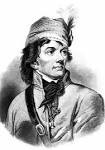Polish general and patriot, (1746-1817)
Tadeusz Kosciuszko was born in Merechevschina in Lithuania on 4 February, 1746. From 1776, he took part in the American War of Independence alongside the insurgents. When he returned to Poland in 1784, he joined the patriots there in the fight against the Russians. He was named Commander in Chief during the insurrection in Krakow (called the Kosciuszko Uprising) in 1794 and was initially extremely successful, managing to chase the Prussians and the Russians from Warsaw. He was beaten in Maciejowice by Suvorov on 10 October, 1794 and captured. After this defeat, the uprising was crushed. This led to the Third Partition of Poland by Russia, Austria and Prussia (1795).
Kosciuszko settled in Paris after he was freed in 1796. He followed Polish events closely and never ceased to hope that one day his nation would be restored. The Napoleonic campaigns of 1806-1807 against the Fourth Coalition gave the Poles new hope that their country would be recreated. In 1806, having defeated the Prussians, Napoleon was still yet to fight the Russians. He sought the help of the Poles in exchange for the restoration of a Polish state; even though he managed to convince part of the population to join him, the Emperor was unable to bring Kosciuszko to his side. The general, although a Republican at heart, would have been willing to accept a monarchy, but only on condition that political freedom be guaranteed and that Austrian Galicia be part of the new state, which would stretch from Riga to Odessa and from Danzig to Hungary. Napoleon considered these conditions to be unreasonable. After the conclusion of the Treaty of Tilsit, the Duchy of Warsaw appeared on the map of Europe, but it did not survive the fall of the Empire. Kosciuszko, who had kept out of Polish matters until then, now attempted to fight the Polish cause during the Congress of Vienna – he failed. He therefore preferred to finish his life in exile rather than to settle in a Polish kingdom “forever tied” to the Tsars' Empire. He died on 15 October 1817 in Soleure, Switzerland.
Author: Eric Anceau, trans. L.S.
Dictionnaire Napoléon, 1999, Fayard
Reproduced and translated with the authorisation of Editions Fayard. All rights reserved.


